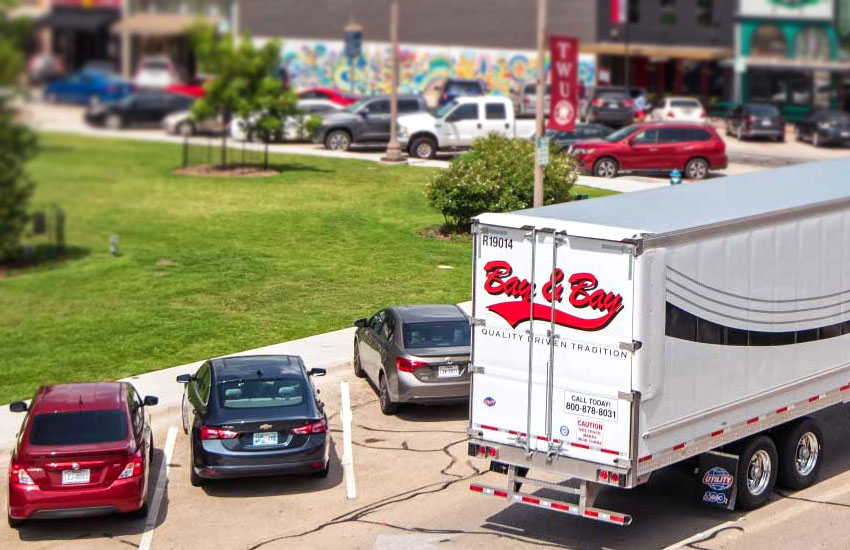You might be on a long road trip and need a break. Can you sleep in your car at a rest stop or truck stop?
Yeah, you can sleep in your car at a rest stop or truck stop. It’s a common thing people do when they’re on long trips and need a break. Rest stops usually have bathrooms and sometimes even vending machines. Truck stops often have more stuff like food places and showers. Just make sure it’s allowed in that area and keep your doors locked. It’s a good way to rest up before hitting the road again.
In this blog post, you will learn about the rules and tips for sleeping in your car at rest stops and truck stops. This will help you stay safe and avoid trouble.
Can You Sleep in Your Car at a Rest Stop Or Truck Stop?
So, you’re on a long road trip, and you start feeling sleepy. You wonder, “Can I just pull over and sleep in my car at a rest stop or truck stop?” The short answer is yes, but there are a few things you should know.
Rest stops are great places for a quick nap. They’re usually along highways and have places to park, restrooms, and sometimes vending machines. Most rest stops are open 24/7, so you can stop anytime. But, some states have rules about how long you can stay.
It’s usually okay to stay for a few hours, but not overnight. It’s a good idea to check the signs or look online for the rules in the state you’re in. Safety is also a big deal. Rest stops can be pretty empty at night, so always lock your doors and keep your phone handy.
Truck stops, on the other hand, are like mini travel centers. They have gas, food, showers, and sometimes even laundry facilities. Places like Flying J or Love’s are open all the time and are used to people sleeping in their cars or trucks. Truck stops are usually busy, so they feel a bit safer because there are always people around.

Plus, they have security cameras and sometimes even security guards. The downside is that it can be noisy with all the trucks coming and going. If you’re a light sleeper, you might want to bring earplugs.
When sleeping in your car, comfort is key. Bring a blanket and pillow from home, and make sure you have enough space to stretch out. If you can, park in a well-lit area, but not directly under a bright light because it might keep you awake. Crack a window for some fresh air but not too much. You don’t want anyone reaching in. Also, having some snacks and water is a good idea in case you get hungry or thirsty.
There are also a few things to be careful about. Some places don’t allow overnight parking at all. You might see signs saying “No Overnight Parking” or “No Camping.” In these places, it’s best to find a different spot to sleep.
You don’t want to wake up to a ticket or have someone knocking on your window in the middle of the night telling you to move. If you’re ever unsure, you can always ask someone inside the rest stop or truck stop.
Another tip is to keep your car clean and organized. If your car is messy, it can make sleeping uncomfortable. Put your bags in the trunk or back seat and try to keep your sleeping area clear. Also, remember to turn off your engine. Leaving it running can waste gas and is bad for the environment. Plus, it can be dangerous if you fall asleep with the engine running in an enclosed space.
Using an app like “Rest Stops” or “TruckStop” can help you find the best places to stop. These apps show you where rest stops and truck stops are, what facilities they have, and even what other travelers think of them. Reading a few reviews can give you an idea of what to expect.
In summary, yes, you can sleep in your car at rest stops and truck stops, but it’s important to know the rules and stay safe. Rest stops are good for quick naps, while truck stops are better for longer stays. Make sure your car is comfortable, park smart, and keep safety in mind. With a little preparation, you can have a restful sleep and be ready to hit the road again in no time. Safe travels!
Differences Between Sleeping at a Rest Stop and a Truck Stop
When you are on a long road trip, you might need to stop and sleep in your car. Rest stops and truck stops are two common places where people park and sleep. Both places have their good and bad points. Here are the main differences between sleeping at a rest stop and a truck stop.
What is a Rest Stop?
A rest stop is a place along the highway where drivers can stop, rest, and use the restroom. Rest stops usually have parking spaces, bathrooms, picnic areas, and sometimes vending machines. They are run by the state and are free to use. Rest stops are made to give drivers a safe place to take a break from driving.
What is a Truck Stop?
A truck stop is a place where truck drivers can park, rest, and get services for their trucks. Truck stops often have parking for cars and trucks, bathrooms, showers, restaurants, and gas stations. Some truck stops also have small stores, repair services, and laundry facilities. Truck stops are run by private companies and are like small travel centers.
Parking Spaces
At rest stops, you will find parking spaces for cars and sometimes separate areas for trucks. The spaces are usually flat and easy to park in. However, rest stops can get full quickly, especially during busy travel times.
Truck stops have large parking areas for trucks and smaller parking areas for cars. There is usually more space at a truck stop, so you are more likely to find a spot to park. The truck parking areas can be noisy with trucks coming and going all night.
Safety
Rest stops are generally safe, but they are often not monitored at night. This means there may not be security guards or cameras watching the area. It is important to be cautious and aware of your surroundings when sleeping at a rest stop.
Truck stops usually have better security. They often have security guards, cameras, and well-lit parking areas. This can make them feel safer for sleeping. However, the high traffic of trucks can be noisy and make it harder to sleep.
Amenities
Rest stops have basic amenities like bathrooms, picnic tables, and sometimes vending machines. They are good for a quick stop but do not have many extras.
Truck stops have more amenities. You can find showers, restaurants, gas stations, and stores at most truck stops. Some even have laundry facilities and truck repair services. If you need more than just a quick rest, a truck stop can offer more comfort and convenience.
Noise Levels
Rest stops can be quieter because they do not have as much traffic. However, they can still be noisy if they are close to the highway or if there are a lot of people stopping.
Truck stops are usually noisier. Trucks come and go all night, and the engines can be loud. If you are a light sleeper, the noise at a truck stop might be a problem.
Length of Stay
Most rest stops allow you to stay for a few hours, usually up to 8 hours. They are meant for short breaks, not long stays.
Truck stops do not have strict time limits for how long you can stay. You can usually park and rest for as long as you need. This can be helpful if you need a longer break or if you want to use the extra amenities.
Cost
Rest stops are free to use. You do not have to pay to park or use the bathrooms.
Truck stops are also free to park, but some amenities like showers and laundry may cost money. If you want to use the extra services, you will need to pay for them.
Both rest stops and truck stops have their pros and cons. Rest stops are good for quick breaks and are usually quieter, but they have fewer amenities and less security. Truck stops offer more services and better security, but they can be noisy. Depending on your needs, you can choose the best place to stop and rest during your road trip.
Time Limits for Parking at Rest Stops or Truck Stops Overnight
When you’re on a long road trip, finding a safe place to rest is important. Rest stops and truck stops are popular choices for taking a break or sleeping overnight in your car. Knowing the time limits for parking at these places can help you plan your trip better. Here are some details about the time limits for parking at rest stops and truck stops overnight.
Time Limits at Rest Stops
Rest stops are places along highways where drivers can take a break, use the restroom, and sometimes get a snack from vending machines. These stops are usually managed by state or local governments. Most rest stops have time limits for how long you can park.
The typical time limit at rest stops is around 8 hours. This limit is in place to prevent people from staying too long and taking up space that other travelers might need. The idea is to give drivers enough time to rest and get back on the road safely. Some states have different rules, so it’s a good idea to check the signs at the rest stop or look up the rules online before you stop.
While 8 hours is the general limit, enforcement can vary. Some rest stops might be more lenient, especially if they’re not busy. However, others might have security or law enforcement officers who check to make sure people are not staying too long. If you need to rest longer, it might be better to find a different place to park.
Time Limits at Truck Stops
Truck stops are designed mainly for truck drivers but are also open to regular travelers. These stops are usually run by private companies and offer many services like fuel, food, showers, and sometimes even laundry facilities. Because truck stops are businesses, they have different rules about parking.
One of the biggest differences between rest stops and truck stops is that truck stops usually do not have strict time limits for parking. Truck drivers often need to take long breaks to meet legal rest requirements, so truck stops are set up to accommodate this. You can generally park at a truck stop for as long as you need without worrying about a time limit.
However, it’s good to remember that truck stops can get very busy, especially at night. Truck drivers have priority for parking spaces, so finding a spot for a car might be harder when the lot is full. Even though there is no strict time limit, it’s considerate to move on if you’ve been parked for a long time and the lot is crowded.
Tips for Parking Overnight
Whether you choose a rest stop or a truck stop, here are some tips to make your overnight stay easier and safer:
- Check the Rules: Look for signs that tell you the parking time limits. If you’re not sure, ask someone at the stop or look up the information online.
- Park Safely: Choose a well-lit area and park near other cars if possible. This can help you feel safer during your stay.
- Stay Aware: Be aware of your surroundings. Lock your doors and keep valuables out of sight. If anything feels unsafe, consider moving to a different spot.
- Plan Ahead: If you know you’ll need a longer break, try to find a truck stop with more amenities. This can make your rest more comfortable and convenient.
Understanding the time limits for parking at rest stops and truck stops can help you plan your trip and ensure a safe and comfortable rest. Rest stops usually have an 8-hour limit, while truck stops are more flexible with no strict time limits. By checking the rules and following some simple safety tips, you can make the most of your overnight stop and continue your journey refreshed and ready to go.
Questions in Your Mind
Is it Legal to Sleep in Your Car Anywhere?
No, it’s not legal to sleep in your car everywhere. Some cities and states have rules against sleeping in vehicles. Always check local laws before you decide to sleep in your car.
Can I Sleep in My Car at Walmart?
Yes, many Walmarts allow overnight parking, but not all of them. It’s a good idea to ask the store manager if it’s okay to stay overnight in their parking lot.
Do I Need to Pay to Sleep at a Truck Stop?
Usually, you don’t need to pay to park and sleep in your car at a truck stop. However, if you use their facilities like showers or laundry, there might be a fee.
Is it Safe to Sleep in My Car at a Rest Stop?
Generally, it is safe to sleep in your car at a rest stop, but always take precautions. Park in well-lit areas, lock your doors, and be aware of your surroundings.
Can I Get a Ticket for Sleeping in My Car?
Yes, you can get a ticket for sleeping in your car if it’s not allowed in that area. Look for signs that say “No Overnight Parking” or similar warnings.
Do I Need to Tell Someone I’m Sleeping in My Car?
You don’t usually need to tell anyone, but it can be a good idea to let a friend or family member know where you are for safety reasons.
Is it Comfortable to Sleep in a Car?
Sleeping in a car can be comfortable if you’re prepared. Bring blankets, pillows, and make sure your seat can recline. Try to create a cozy sleeping area.
Can I Use My Car’s Heater or AC While Sleeping?
It’s not safe to leave your car’s engine running while you sleep. This can lead to carbon monoxide poisoning. Instead, dress warmly or use blankets to stay comfortable.
Do I Need a Special Permit to Sleep at a Rest Stop?
In most cases, you don’t need a special permit to sleep at a rest stop. However, some places have time limits on how long you can stay, so check the signs for any rules.
Is it Safe to Sleep in My Car in Urban Areas?
Sleeping in your car in urban areas can be riskier. There might be more noise and higher chances of theft. If you must sleep in an urban area, find a safe, well-lit place, and stay alert.


